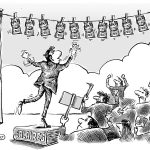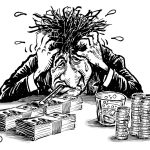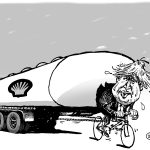Asia, shock in return
The battle against the Covid-19 is far from won in Asia. But China is already trying to write its history.
Captured by our own fight against the Covid-19, subject to the constraints of confinement which is spreading day by day, we may have lost sight of the fact that the pandemic was far from being overcome in Asia. The first affected countries, starting with China, are now fearful of a second wave. In addition, the health threat is compounded by the economic consequences of the spread of the pandemic to the planet. So we observe carefully what is happening in China.
India has just confined itself for 21 days, extending its prescription to public transport and threatening the economic survival of millions of its citizens. Across Asia, borders are more tightly closed to foreigners – especially European and American visitors – by also imposing strict quarantines on nationals returning to the country. This is the case of China, Hong Kong, Taiwan and even Thailand. Where only schools had closed, more and more public and gathering places must lower the curtain. In Japan, just after announcing the postponement of the Olympic Games, new cases of contamination led the governor of the capital to reinforce measures to close public places and calls to stay at home. The same has happened in recent days in South Korea, Singapore, several provinces of Indonesia, the Philippines and even Malaysia. Thus, even where systematic tests had been favored to limit the constraints on the activity and the movement of people, the confinement gradually hardened.
Japan advances new stimulus package in the amount of … $ 500 billion.
As a result, the recession is expected to be brutal, and hopes for a rapid rebound in activity have been dashed with the spread of the pandemic outside of China. Production chains across the region are breaking due to border closures and business disruptions. The massive decline in domestic, regional and international demand has considerably limited shipping areas. Thus, upstream of the production cycle, the Japanese blast furnaces will probably stop. The chemical industry is also under threat. The already fragile automotive and tech sectors remain particularly affected. Investment deferrals are legion.
As everywhere, economic and financial support plans are flourishing. The Indian government has announced that it will release 23 billion dollars in aid, while Malaysia promises 53 billion dollars. Shinzo Abe’s government is putting forward an exceptional $ 500 billion stimulus package for the month of May. In China, the authorities are preparing to step up budgetary aid and monetary support measures.
Are Chinese statistics reliable? China is struggling to convince.
Is the second world power restarting for good? The first question calls for another. Is the pandemic well contained? What is the outcome? As the number of deaths increases in Europe and the United States, discomfort grows. Are Chinese statistics reliable? Is the option of brutal confinement (accompanied by population control, little concerned with individual liberties) really the only possible way? China, which claims to be exemplary in the fight against the pandemic, is struggling to convince. Authorities are increasing reports of the gradual lifting of the containment and return of migrant workers, stranded in the provinces since the New Year celebrations. The increase in car traffic and consumption of electricity is evidence of this improvement. However, it remains partial and fragile in view of the risk of the pandemic re-emerging. If the activity is not restarted quickly, are the authorities afraid of being unable to prevent a massive exodus of foreign companies from their soil? There the questions do not stop, nor the disturbance. Suspicions and accusations about the origin of the virus have rekindled tensions with the United States. Aid shipments to many countries, the promise of a “Silk Road” to health, stir up distrust among recipients, as much as it appeals to sometimes-at-risk governments. The “diplomacy of surgical masks” (dispatched in haste to the Netherlands, or the Czech Republic among others), the sending of doctors and other materials, are suspected of being subject to cumbersome conditions (signing of commercial contracts , diplomatic alignment) that could make these initiatives counter-productive in the long run.
The situation therefore remains tense in Asia, where the threat of a pandemic counter-shock has not yet been ruled out. China’s role and discourse are debated.



